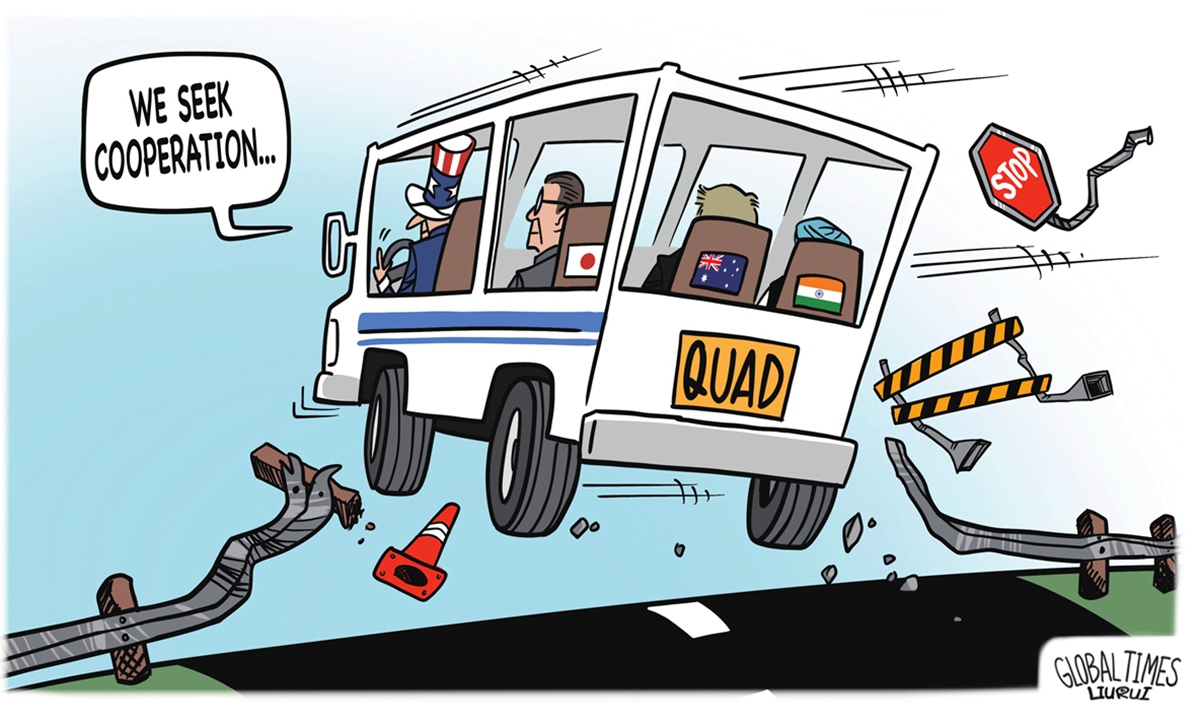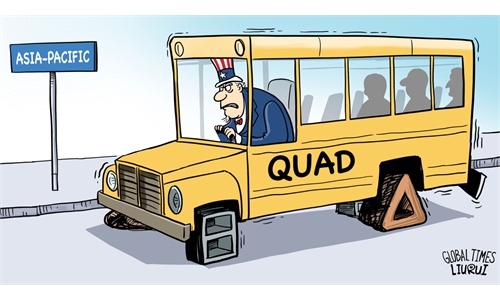
Quad Photo: Liu Rui/GT
The Malabar region on the west coast of India is known for its pepper production. The Malabar exercise, founded in 1992, was originally a bilateral event between the US and India, and Japan and Australia started to participate in the drill in later years. Since then, the Malabar maritime exercise has become one of the important cornerstones of the Quadrilateral Security Dialogue (Quad) military cooperation between the US, Japan, Australia and India, full of a "peppery" atmosphere.
During the Malabar 2024 joint military exercise that will conclude on Friday, the US, India, Japan and Australia sent a frigate, several destroyers and P-8 patrol aircraft to participate, carrying out various operations, including anti-submarine warfare, air defense and joint tactical maneuvers. The objective is self-evident, to strengthen Quad's cooperation in the security field.
This happened after last month's Quad Summit held in the US. According to a joint statement released by the White House, the US, Japan, India and Australia have reached consensus and cooperation projects in health security, maritime security, key and emerging technologies, quality infrastructure, climate and clean energy, cyber, space and humanities. It was also announced that joint coast guard patrols will be held in 2025 to enhance the Indo-Pacific Partnership for Maritime Domain Awareness.
From Washington's perspective, through further integration of the original bilateral security alliance, promotion of the quadrilateral cooperation mechanism and the eventual establishment of a joint maritime cruising, it is the priority for Quad to improve the "Indo-Pacific" region maritime military cooperation, and also strengthen weapons platform and military equipment interoperability as the key cooperation content.
Before 2020, India was not so active in the US' "Indo-Pacific Strategy." Citing "non-alignment" or "strategic autonomy," it tried to maintain some diplomatic balance between the major powers while seeking to integrate into the US and the Western camp.
However, after 2020, China-India relations fell to a low point due to the border conflicts, and hostility from all sectors of India to China increased sharply. Driven by internal and external factors, India's policy toward China has undergone obvious negative changes, increasingly taking the side of the US on geopolitical and security issues, and becoming a new glue for Quad.
This February, the US Ambassador to India, Eric Garcetti, publicly said that India was in Quad's "driving seat," while the US is "in the next seat with the corrective steering wheel." To some observers, this means New Delhi, once the weakest link, is today the leader of Quad. India now is no longer content with "passive participation" in the quadrilateral security cooperation, but is actively developing its maritime security agenda and seeing the Quad as the most important platform for its geopolitical cooperation in the "Indo-Pacific" region.
India's initiative to push Quad toward the direction of the mechanism's materialization can meet the realistic needs of the US in the "Indo-Pacific Strategy" and show its attitude of "alienating China and getting closer to the US." This is in line with Indian policymakers' current diplomatic thinking of "engaging the US and managing China." Moreover, this can help India make China feel its "clear and powerful signal," amplifying its leverage against China amid the border conflicts. It can also show New Delhi's determination to counter Beijing and cater to the political demands of anti-China forces in India.
China has always been open to normal maritime cooperation among relevant countries. It believes such a type of cooperation between countries is conducive to promoting regional peace, stability and prosperity. However, putting together closed and exclusive "small circles" will only damage regional cooperation that is based on mutual trust and provoke camp-based confrontation. Quad treats the oceans as an arena for geopolitical games, which runs counter to the trend of historical development. Small gangs like Quad will never make a big wave.
The author is the director of the research department at the National Strategy Institute at Tsinghua University. opinion@globaltimes.com.cn

